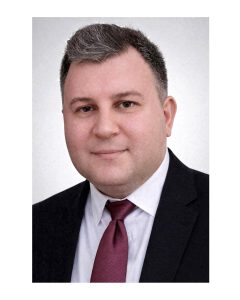Address: 2nd Medicine Bldg., Spl. Tudor Vladimirescu nr. 14
Telephone: 0256/493085
E-mail: fiziopatologie@umft.ro
Head of the Academic Department
Members
Auxiliary staff
Pathophysiology is the topic that represents a typical example of interdisciplinarity being recognized as the bridge between basic sciences (Physiology, Biochemistry, Biophysics, Cellular & Molecular Biology, Medical Genetics) and clinical medicine. It is not limited to the description of the functional changes of the cells and tissues elicited by the disease, which are complementary to the structural ones that represents the topic of Morphopathology.
Pathophysiology is the integrative science that allows the knowledge and understanding of the:
- etiology and pathogenesis of the disease, i.e., the causes and mechanisms underlying the initiation, progression, compensation and finally, healing of diseases/pathological processes;
- relationship between cellular/subcellular changes at tissue/organ level and their effects on the function of the whole body;
- clinical manifestations (signs, symptoms) of the disease through a logical cause-effect type approach;
- pathogenetic diagnosis based on algorithms, which explore the functional and lesional changes specific for a particular disorder;
- rational background for the correction of functional imbalances, for therapy and, when appropriate, for the prevention of diseases.
The foundation of the study of Pathophysiology has been established in Timișoara back in 1950 by Prof. Ioan Cotăescu, corresponding member of the Academy of Medical Sciences, who led the chair until 1977. Under his supervision, teaching and research laboratories were organized and a complex research program was started addressing the pathomechanisms of cell metabolism integrated with studies of cell pharmacodynamics.
Between 1977-1979 the chair was led by Prof. Adrian Creţu.
From 1979 to 2009, under the leadership of Prof. Alexandru Cristescu, member of the Academy of Medical Sciences, a School of Pathophysiology was established in Timișoara and a program of modernization of both teaching and research activity was initiated by introducing modern methods of teaching and computer-assisted examination as well as by implementing a system of data acquisition and automatic processing of the results of experimental and functional investigations. A unitary teaching system was introduced to the General Medicine study program whereby unitary lecture and laboratory notes were published in Romanian, English and French languages. The chair has a long-standing tradition in the field of cardiovascular research and one of the major topics was the study of myocardial ischemia/reperfusion injury as well as that of cardioprotective strategies. In the 90s, research contracts funded by the Academy of Medical Sciences allowed the construction of the equipment for body surface electrocardiographic mapping and of non-invasive exploration of peripheral circulation, respectively; also, the preclinical testing of several cardiovascular drugs was conducted. Under his leadership, the Laboratory for Functional Explorations, Laboratory for Experimental Electrophysiology, and Laboratory for In Vitro Experimental Studies were established.
Between 2009 and 2019, the chair was led by Prof. Danina-Mirela Muntean who has shown constant interest in increasing the quality of education, in terms of both using modern, interactive teaching methods and providing on-line updated lectures, as well as in continuing and expanding the fields of scientific research.
Regarding the teaching activity, the ppt presentions of both lectures and laboratories of Pathophysiology were uploaded on the university Moodle platform, the information being unitary for a certain study program and regularly updated and adapted to the requirements of each specialization. The teaching activity is student-centered, aimed at improving their communication skills and critical thinking in order to link the pathomechanisms of diseases (presented during the lectures) with the case studies and lab investigations (detailed during the laboratories). Development of analytical medical thinking and a unitary vision of diseases are prerequisites in order to prepare the students to formulate the diagnosis in their future clinical practice. The practical activity is carried out in five laboratories and has the following objectives: i) systematic analysis through case studies of pathological laboratory bulletins and functional explorations, and ii) presentation of several diagnostic algorithms – in order to help the formulation of positive and differential diagnosis. Also, in line with the concept of “education through research”, demonstrative videos were recorded for the students, showing experimental models and modern research techniques (high-resolution respirometry using the Oxygraph 2K and the analysis of oxygen consumption coupled with the extracellular acidification rate assessment using the Seahorse XF24e flow analyzer) currently used in the research activity.
As concerning the scientific research, the members involved in translational cardiovascular research have implemented novel experimental models and research techniques, allowing them to become a competitive partner on the European research market and identify/consolidate national and international interdisciplinary partnerships. Moreover, besides the translational research in the field of cardiovascular protection (including in humans), in the past decade, special attention has been paid to the study of endothelial and mitochondrial dysfunction as potential therapeutic targets in cardio-metabolic or renal pathology, senescence and carcinogenesis. Other important research directions are represented by the ex vivo investigation of the phytochemicals effects on endothelial and mitochondrial function, the study of oxidative stress with a systematic focus on MAO-related oxidative stress, and the contribution of arterial stiffness changes to the pathogenesis of cardiovascular diseases, in the presence or absence of comorbidities.
The research projects carried out within our chair from 2006 to date have allowed the endowment of the existing laboratories with novel equipments and, more importantly, 4 novel laboratories have been established, as follows: Laboratory of Molecular Biology and Electrophysiology (2013), Laboratory of Confocal Microscopy (2012), Laboratory for Experimental In Vitro and In Vivo Studies (2010), Laboratory of Mitochondrial Studies (2008), the latter being a national premiere.
In 2014, the Centre for Translational Research and Systems Medicine was established within the chair of Pathophysiology, with the approval of the University Senate, under the coordination of Prof. Muntean M. Danina as director. The centre consists of 6 laboratories where translational and interdisciplinary research activity is carried out, in preclinical-clinical partnership, aiming to contribute to the international visibility of the university. Since 2016, the centre has been registered on the erris.ro website and starting with 2020 it was re-accredited, in partnership with the chair of Public Health and Sanitary Management, as one of the 10 Advanced Research Centres of the university, the related information being transferred in 2023 to the eertis.ro website.
A particular attention is permanently paid to the development of highly-qualified human resources – PhD and postdoctoral students – who have benefited from scholarships / research mobility abroad and also, to the involvement of undergraduate students in research. Over the past two decades the young researchers coordinated by the members won several prizes and awards in both national and international conferences and also, in UEFISCDI competitions.
Students interested in the research activity are affiliated to the research centre, work under the direct supervision of the chair members, participate in lab meetings where the results of the research activity of the team/research novelties are presented, attend national / international student conferences and finalize license theses. The chair was also the host for foreign students who chose our university within the IFMSA (International Federation of Medical Students Association) Research Exchange summer program.
Currently, the chair is led by Prof. Claudia Borza who is constantly concerned with maintaining the quality of the educational and research activities at national and international standards.
The Pathophysiology lectures were posted between 2009 and 2015 on the chair website. Starting with the academic year 2016-2017, both Pathophysiology lectures and laboratories, annually updated, are posted on the university Moodle e-learning platform. The members of the chair have agreed to the publication of the didactic materials (lecture and lab notes) in e-book format posted on the website of the “Victor Babeș” Publishing House (and also on the Moodle platform)
Starting with the academic year 2013-2014, in the Pathophysiology department the volunteering program in the academic activity (VADA) was implemented, under the coordination of Prof. Danina M. Muntean. The program allows students with the best results from the IVth – VIth year of the Faculty of Medicine (Romanian, English and French sections) to participate as volunteers in academic activities within the chair or research activities within the Centre for Translational Research and Systems Medicine. So far, a number of 46 students enrolled in the Medicine study program have completed the volunteer activity (of which 4 students from the English section and 3 from the French section).
Students enrolled in the volunteering program and those affiliated to the research centre have participated with oral/poster presentations and have won prizes in international and national scientific meetings for students and young researchers, e.g.:
- Avram Vlad, Stud. Bucuras Petru, Stud. Lelcu Theia, Muntean, D. Teachers and Students: A Symbiosys for Excellence in Training.Timisoara Medical Education Days 3rd Edition, 24-26 March 2014, Timisoara, First Prize
- Avram Vlad, Stud. Barbulescu Laura, Stud. Lelcu Theia, Muntean, D. The Tutoring Experience As Part Of Student Centered Education. Timisoara Medical Education Days, 15-17 April 2015, Timisoara, First Prize
- Ciobanu Andra Vera, Stud. Băleanu Maria, Stud. Simonescu Mariua, Sturza, A., Muntean, D. Hydrogen Peroxide Contributes Directly To Endothelial Dysfunction In Experimental Diabetes Mellitus. XIXth Edition – The National Congress for Medical Students and Young Doctors, 10-13 December 2015, Bucharest, Romania, Mention for Poster Presentation
- Ancusa Sebastian, Duicu, O.M., Sturza, A., Muntean, D.M. Characterization of the effects of quercetin on bioenergetics profile of B164A5 murinic melanoma cell line. MEDIS 2016 – The XIXth International Congress for Medical Students and Young Doctors, 3-6 March 2016, Timisoara, First Prize for Oral Presentation „Preclinical Science Section”
- Simonescu Marius, Muntean, D., Concept Mapping in Pathophysiology. Towards Meaningful Collaborative Learning and Self-Assessment. TIM MED Conference 5th Annual Symposium ”Focus On Assessment!, 3-5 November 2016, Timisoara 2nd Prize
- Stu Băleanu Maria, Dănilă M., Sturza A., Muntean, D. Modulation Of Vascular Function Via Purinergic P2Y11 Receptor Signaling In Acute Experimental Inflammation. MEDIS 2017 – The XXth International Congress for Medical Students and Young Doctors, 16-19 March 2017, Timisoara, Prize for Poster Presentation „Preclinical Science Section”
- Stu Ugrin Petre Deian, stud. Untaru Paul, Sturza A., Muntean, D. Monoamine Oxidase Is A Mediator Of Endothelial Dysfunction In Human Mesenteric Arteries In The Setting Of Inflammation. 2018 Annual Undergraduate Research Program (TDK) of the University of Szeged, 16 November 2018, Szeged, Hungary, Best Foreign Presentation Prize
- Lința Adina, Bînă AM, Muntean DM. Impairment of Placental Mitochondrial Respiration In Preeclampsia Associated With Fetal Growth Restriction. 2021 Annual Student Research (TDK) Conference of the University of Szeged, 17-19 November 2021, Szeged, Hungary
- Tămaș Alexandru, Bînă AM, Muntean DM. Cell-Permeable Succinate Alleviates Platelet Respiratory Dysfunction in Both Moderate and Severe COVID-19 . 2022 Annual Student Research (TDK) Conference on Medicine, Dentistry, Pharmacy and Health Sciences, 16-18 November, 2022, Szeged, Hungary.
and have co-authored scientific papers (name of students with bold) published in journals with IF, e.g.:
- Duicu, O.M., Privistirescu, A., Wolf, A., Petruş, A., Dănilă, M.D., Raţiu, C.D., Muntean, D.M., Sturza, A. Methylene Blue Improves Mitochondrial Respiration And Decreases Oxidative Stress In A Substrate-Dependent Manner In Diabetic Rat Hearts. Can J Physiol Pharmacol 2017; 95(11):1376-1382.
- Sturza, A., Pavel, I., Ancușa, S., Danciu, C., Dehelean, C., Duicu, O., Muntean, D. Quercetin Exerts An Inhibitory Effect On Cellular Bioenergetics Of The B164A5 Murine Melanoma Cell Line. Mol Cell Biochem. 2018; 447(1-2):103-109.
- Savencu CE, Lința A, Farcaș G, Bînă AM, Crețu OM, Malița DC, Muntean DM, Sturza A. Impact of Dietary Restriction Regimens on Mitochondria, Heart and Endothelial Function – A Brief Overview. Front Physiology 2021 12:768383
- Bînă, A.M., Aburel, O.M., Avram, V.F., Lelcu T., Lința A.V., Chiriac D.V., Mocanu A.G., Bernad A., Borza C., Craina M.L., Muntean D.M., Crețu O.M. Impairment of mitochondrial respiration in platelets and placentas: a pilot study in preeclamptic pregnancies. Mol Cell Biochem 2022; 477(7):1987-2000.
- Bînă AM, Sturza A, Iancu I, Mocanu AG, Bernad E, Chiriac DV, Borza C, Craina ML, Popa ZL, Muntean DM, Crețu OM. Placental oxidative stress and monoamine oxidase expression are increased in severe preeclampsia: a pilot study. Mol Cell Biochem 2022;477(12): 2851-2861.
I. Research topics:
- Mitochondrial dysfunction in cardiometabolic pathology, senescence and carcinogenesis: from mechanisms to novel therapeutic targets.
- Endothelial dysfunction: etiopathogenesis and innovative therapeutic approaches.
- Evaluation, prevention and control of oxidative stress: focus on the contribution of monoamine oxidase (MAO) to the pathogenesis of chronic noncommunicable diseases.
- Strategies for cardiovascular, metabolic, renal and hepatic protection in animals and humans: translational studies on the central role of mitochondria.
- Study of the mechanisms of action of phytochemical compounds at mitochondrial and vascular level.
- Studies of changes in arterial stiffness and signal-mediated electrocardiography in cardiovascular pathologies and comorbidities.
II. ISI articles published by the members of our chair in journals with IF in the last 10 years > 100.
III. Research projects – with the chair of Pathophysiology as coordinator or partner:
International projects:
- Romania-France bilateral cooperation project competition Romania-France Cooperation Mobilities Program Brancusi-Hubert Curien “Novel Insights in Vascular Protection Mediated By Purinergic Signaling” – acronym PUR-VASC-PROTECT, code 75 BM, period: 2017-2018
- Romania-Hungary cross-border cooperation project 2007-2013 “Twinning Project for the Joint Development of Research Infrastructure” – acronym HURO-TWIN, code HURO / 1101/086, period: 2013-2015
- Romania-Hungary cross-border cooperation project 2007-2013 “Development of the Infrastructure for a Pole of Excellence in Cardiovascular Research” – acronym HURO-CARDIOPOL, code HURO 0802 / 011_AF period: 2010-2012
- Romania-Hungary cross-border cooperation project 2007-2013 “Implementation of a Regional Project for Translational Medical Research Concerning Diseases with High Impact in Population”, acronym HURO-TRANS-MED, code HURO 0901/137 / 2.2.2, period 2010- 2012
- CAPACITIES Project Module III, bilateral cooperation Romania – Hungary, “Implementation of a regional training network in experimental cardiology”, acronym CARDIO-REG, contract 55/2008, period: 2008-2009
International networks:
- European projects type COST (COoperation in the field of Scientific and Technical Research):
Prof. Danina M. Muntean – member representing RO in the Management Committee of the following COST actions:
– „EUropean network to tackle METAbolic alterations in HEART failure – EU-METAHEART”, cod CA22169, perioada 2023-2027
– “Realizing the Therapeutic Potential of novel Cardioprotective Therapies – EU-CARDIO-PROTECTION”, code CA16225, period 2017-2022 and in continuation COST Innovation Grant IG16225, period 2022-2023
– “Mitochondrial Fitness Mapping – Evolution-Age-Gender-Lifestyle-Environment – MITO-EAGLE”, code CA15203, period 2016-2021
– “The Network for the Biology of Zinc”, code TD1304, period 2013-2017
– “European Network on Gasotransmitters”, code BM1005, period 2010-2015
– “Hypoxia Sensing, Signaling and Adaptation”, BMBS code TD0901, period 2010-2013
– “Bioactive Food Components, Mitochondria Function and Health”, code FA0602, per. 2007-2011
Prof. Ioana Mozoș – member representing RO in the Management Committee of the action:
– “Network for Research in Vascular Aging”, code CA18216, period 2019-2023
Assoc. Prof. Adrian Sturza – substitute member representing RO in the Management Committee of the COST actions:
– “Realizing the therapeutic potential of novel cardioprotective therapies – EU-CARDIO-PROTECTION”, code CA16225, period 2017-2023
– “European Network on Gasotransmitters”, code BM1005, period 2010-2015
National projects:
- Exploratory research project type IDEI “Evaluation of the cardioprotective effects of ATP-dependent potassium channel modulators”, code PN-II-ID-PCE-2012-4-0512, period: 2013-2016
- PNCDI II Project, Program 4, category Partnerships in priority areas type PC “Cardioprotective strategies for reperfusion – mitochondria as a multiple therapeutic target” – acronym: CARDIO-MITO-PROT, code 2560/2008, period: 2008-2011
- Grant of the Romanian Academy “In vitro studies on the respiratory function of subpopulations of mitochondria isolated from the mammalian myocardium”, code 266/2007, period: 2007-2008
- CNCSIS type A project “The integrative role of mitochondria in cardioprotection in experimental myocardial ischemia/reperfusion”, code 752/2006, period: 2006-2007
Internal university projects:
- EXPERIENCED RESEARCHERS type project “Innovative translational study: from basic research to clinical applicability regarding mitochondrial dysfunction and inflammation in chronic diabetic kidney disease”, acronym MITO-DIAB, code 6EXP / 2020, period: 2020-2023
- POSTDOC type project “Modulation of mitochondrial function by methylene blue in the cardiovascular adipose tissue”, acronym MITO-MB-CURATE, code 2POSTDOC / 2020, period: 2020-2022
- POSTDOC type project “Monoamine oxidase and metabolic memory – repositioning MAO inhibitors as vascular protective agents in diabetes”, acronym MAO-DIAB, code 6POSTDOC / 2020, period: 2020-2022
- DOCTORAL project “Translational study on the characterization of mitochondrial dysfunction and the identification of metabolomic biomarkers with diagnostic and prognostic value in patients with chronic kidney disease”, acronym MET-MIT-CKD, 6DOC / 2020, period: 2020-2023
- Partnerships in fundamental innovative research type project “The role of vitamin D in modulating vascular and mitochondrial function in adipose tissue in animals and humans”, acronym VASC-ADIPO-MIT, code PIII-C5-PCFI-2017 / 2018-01, period: 2017-2018
- Partnerships in fundamental innovative research type project “New pharmaceutical approaches for modulating the bioavailability of flavonoids with chemopreventive potential in malignant melanoma” – acronym “FLAVO-FORM”, code PIII-C2-PCFI-2015 / 2016-04, period: 2015-2016
- Partnership in innovative fundamental research type project “The contribution of monoamine oxidase-induced oxidative stress to cardiovascular dysfunction and the prognosis of coronary patients with and without diabetes” – acronym MAO-CARDIO-SOX, code PIII-C1-PCFI-2014, period: 2014 -2015
- Project for young researchers “Research on the interaction of mitochondria-purinergic signaling in cardioprotection in postischemic reperfusion” – acronym MITO-P2-REP, code PII-C3-TC-2015
- Project for young researchers “The role of monoamine oxidases in the pathogenesis of peripheral arteriopathy in experimentally induced diabetes” – acronym ARTERIO-MAO-DIAB, code PII-C2-TC-2014
IV. International cooperation (alphabetical order):
- Denis Angoulvant, Head of Cardiology Clinic at Tours University Hospital, Vice-Dean in charge of Medical Pedagogy at the Faculty of Medicine, University of Tours, Deputy Director of the Research Laboratory “Transplantation, Immunity and Inflammation“, President of the Scientific Committee of the French Federation of Cardiology, Honorary Member of the Romanian Society of Cardiology – Visiting Professor of UMFVBT
- Atanas Atanasov, Department of Pharmacognosy, University of Vienna, Vienna, Austria; Institute of Neurobiology, Bulgarian Academy of Sciences, Sofia, Bulgaria; Institute of Genetics and Animal Breeding, Polish Academy of Sciences, Jastrzębiec, Magdalenka, Poland
- Ljuba Bacharova: Institute of Pathophysiology, Medical Faculty, Comenius University, International Laser Center, Bratislava, Slovakia
- István Baczko, Head of the Department of Pharmacology and Pharmacotherapy, Faculty of Medicine, University of Szeged, Hungary; General Secretary of the International Academy for Cardiovascular Sciences – European Section (IACS-ES)
- Maciej Banach, Director of the Hypertension Department of the Medical University of Lodz, Poland, Secretary of the European Atherosclerosis Society (EAS), Founder and President of the Polish Lipid Association, Founder and President of the International Lipid Expert Panel (ILEP), member of the Presiding Board of Scientific Committee of the Polish Ministry of Health, Past-President of the Polish Mother’s Memorial Hospital & Research Institute, Honorary Member of the Romanian Society of Cardiology – DHC of UMFVBT
- Ralf P. Brandes, Director of the Institute of Cardiovascular Physiology, Goethe University from Frankfurt, Germany
- Bernhard Brüne, Director of the Institute of Biochemistry Pathobiochemistry of the Faculty of Medicine, Goethe University from Frankfurt, Germany
- René Csuk, Director of the Department of Organic Chemistry, Martin Luther Halle-Wittenberg University from Halle, Germany
- Fabio Di Lisa, Professor of Biochemistry, Department of Biomedical Sciences of the Faculty of Medicine of the University of Padua, Italy – DHC of UMFVBT
- Eskil Elmer, Director of the Mitochondrial Medicine Research Unit, Lund University, Sweden
- Peter Ferdinandy, Director of the Department of Pharmacology and Pharmacotherapy and the Vice-Rector for Scientific Research of the Faculty of Medicine, Semmelweis University, Budapest, CEO of the PharmaHungary Group, Hungary
- Derek J. Hausenloy, Professor in Cardiovascular & Metabolic Disorders Signature Program, in the Medical School, Duke-National University Singapore and IP in the University College London, UK – Visiting Professor of UMFVBT
- Jarosław Horbańczuk, Institute of Genetics and Animal Breeding, Polish Academy of Sciences, Jastrzębiec, Poland
- Norbert Jost, Research Group for Cardiovascular Pharmacology of the Hungarian Academy of Sciences, Department of Pharmacology and Pharmacotherapy, Faculty of Medicine, University of Szeged, Hungary
- Vladimir Jakovljevic, Professor of Physiology and Dean of the Faculty of Medicine of the University of Kragujevac, Serbia, President of the International Academy for Cardiovascular Sciences – European Section (IACS-ES), President of the International Society for Pathophysiology (ISP) – Visiting Professor of UMFVBT
- Peter Kruzliak, 2nd Department of Surgery, Faculty of Medicine, Masaryk University, Brno, Czech Republic, Faculty of Medicine, St. Anne’s University Hospital and Masaryk University, Brno, Czech Republic; Department of Internal Medicine, Brothers of Mercy Hospital, Brno, Czech Republic
- Antigone Lazou, Director of the Laboratory of Animal Physiology, School of Biology, Aristotle University, Thessaloniki, Greece – Visiting Professor of UMFVBT
- Christoph Maack, Head of the Department of Translational Sciences in the Comprehensive Heart Failure Center (CHFC), Department of Internal Medicine of the University Clinic in Würzburg, Germany, President of the International Society for Heart Research – European Section (ISHR-ES)
- Mariana Roșca, Director of the Department of Fundamental Sciences, College of Medicine, Central Michigan University, Mount Pleasant, Michigan, USA – Visiting Professor of UMFVBT
- Milan Stehlik, Linz Institute of Technology, Johannes Kepler University, Department of Applied Statistics, Johannes Kepler University, Linz, Austria
- András Varró, Coordinator of the Research Group for Cardiovascular Pharmacology of the Academy of Sciences of the University of Szeged, Hungary, President-elect of the International Academy for Cardiovascular Sciences (IACS) – Visiting Professor of UMFVBT
V. Organization of the international conference The 9th European Section Meeting of the International Academy of Cardiovascular Sciences (IACS-ES) – October 4-7, 2023, by the Centre for Translational Research and Systems Medicine.
The scientific program included lectures by 52 prestigious invited speakers from abroad (15 countries) who, together with the national lecturers and selected oral presentations, addressed numerous topics of fundamental and clinical, translational and integrative research in cardiovascular pathology during 16 sessions and 2 symposia. Young researchers (PhD students and postdocs) presented their research results in the form of oral communications and posters and the free participation of students was encouraged; the undergraduate medical students attended the meeting in large numbers and contributed to its organisation as volunteers.
The event served as a framework for disseminating the latest findings in research on cardiovascular diseases and related co-morbidities, provided an excellent opportunity for participants to establish collaborations with research groups abroad and increased the international visibility of the university.
During the conference, the university management granted 3 awards in recognition of professional prestige and excellence in research activity, as follows:
i) Lifetime Leadership in Cardiovascular Sciences Award for Dr. Naranjan Dhalla, University of Manitoba, Canada
ii) Excellence in Cardiovascular Research Awards for Roberto Bolli, Past-President of IACS, University of Louisville, USA and Prof. Zoltán Papp, Vice-Dean for Scientific Affairs at the Faculty of Medicine, Debrecen, Hungary
The conference program and e-book of abstracts are available here: http://www.iacs.sav.sk/meetings/iacs-es.html.
A report on the conference and an overview of the university were included in the December issue of the International Academy of Cardiovascular Sciences (IACS) newsletter and can be read here:
https://iacsworld.com/wp-content/uploads/2023/12/CV-Network-Vol-22.-No.-4-December-2023.pdf
Link to the Photo Gallery – click here
Prof. Claudia Borza:
- IACS Distinguished Leadership Award offered by the International Academy of Cardiovascular Sciences (IACS) at the conference The 9th European Section Meeting of the International Academy of Cardiovascular Sciences (IACS-ES), 4–7 October 2023, Timișoara, Romania
- Awards for patents (2015-2019)
Prof. Danina M. Muntean:
- IACS Lifetime Achievement Award offered by the International Academy of Cardiovascular Sciences (IACS) at the conference The 9th European Section Meeting of the International Academy of Cardiovascular Sciences (IACS-ES), 4–7 October 2023, Timișoara, Romania
- Third Prize for teaching activity within the Faculty of Medicine of the “Victor Babeș” University of Medicine and Pharmacy from Timișoara (2015)
- International/national awards for the supervised PhD students/undergraduate students (over 50, from 2009-present)
Assoc. Prof. Adrian Sturza:
- IACS Distinguished Service Award offered by the International Academy of Cardiovascular Sciences (IACS) at the conference The 9th European Section Meeting of the International Academy of Cardiovascular Sciences (IACS-ES), 4–7 October 2023, Timișoara, Romania
- Diploma for special merits in scientific research activity awarded by the Rector of UMFVBT (2018)
- Early Career Investigator Award granted by the International Academy of Cardiovascular Sciences – European Section at The 5th European Section Meeting of IACS, 23-26 May 2018, Smolenice / Bratislava, Slovakia
- Diploma of merit for the scientific research activity offered by the Timișoara City Hall (2014)
- Eminent Researcher Award offered by the Association “University Horizons” and the Romanian Academy – Timișoara branch (2014)
Assoc. Prof. Oana-Maria Aburel (Duicu):
- First Prize for scientific activity within the UMFVBT (2014)
Lecturer Maria-Corina Șerban – several UEFISCDI awards for scientific papers (2014-2019)
2020
Prof. Ioana-Monica Mozoș
- Cardiovascular Pathophysiology and Interdisciplinary Collaboration
2017
Prof. Claudia Borza
- Diagnostic Role of Serum and Functional Markers in Pathology: Experimental and Clinical Studies
Prof. Danina-Mirela Muntean
- Mitochondria as Therapeutic Target in Translational Research And Drug Repurposing













